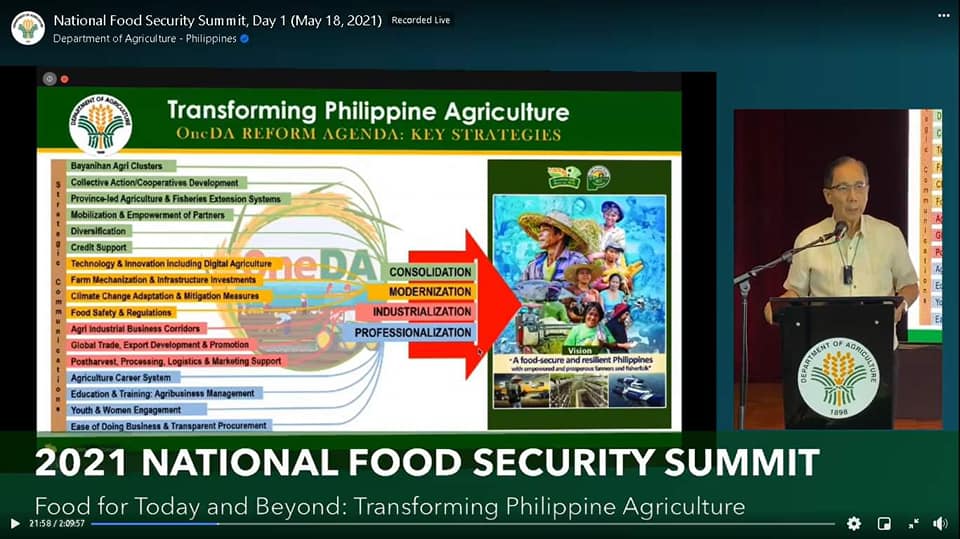
The aggie dept stages the NFSS to solicit doable strategies and policy recommendations to help the agri-fishery sector overcome its challenges as well as update commodity industry roadmaps and craft the country’s food security blueprint.
Serving as the culmination of the regional summits held in April and May, the Department of Agriculture (DA) staged the two-day 2021 National Food Security Summit (NFSS), held at the BSWM Convention Hall, Elliptical Road, Diliman, Quezon City and via virtual platform.
Centered on this year’s theme: “Food for Today and Beyond: Transforming Philippine agriculture”, said convention aimed to solicit doable strategies and policy recommendations to help address the major challenges besetting the agri-fishery sector, update commodity industry roadmaps and craft the country’s food security blueprint.
“A pandemic with devastating impact on global health continues to ravage economies and societies, threatening to put more people into extreme poverty, and many more into chronic hunger and malnutrition.
Further, unsustainable agri-food systems put pressure on our dwindling land and water resources, biodiversity, the environment, and climate,” Agriculture Secretary William D. Dar relayed to the Summit delegates.
Likewise, he noted, these will impact the nation’s ability to feed its growing population and in bringing about meaningful progress in the countryside now and in the future.
“Therefore, it is imperative to sustain and strengthen our food production, distribution and logistics systems to ensure that the COVID-19 pandemic and natural and man-made disasters do not threaten food security and nutrition, and improve resilience to future shocks,” the DA chief underscored.
Drawing about 15,000, including from the Northern Mindanao region, the NFSS gathered a myriad of participants, from the national and local government agencies, international organizations, the private sector, farmer’s cooperatives and associations, agricultural and fishery councils, non-governmental and civil society organizations, youth and the academe.
Of which, they have witnessed talks from different homegrown food security experts and from abroad, including benchmarking from shared stories of key officials, successful farmers, fishers, agripreneurs and the youth.
Parallel sector workshops were also held to seek inputs for the country’s major agri-fishery commodities such as rice, livestock, poultry, vegetables, aquaculture, capture fisheries, banana, pineapple, mango, coconut, sugarcane, coffee and cacao.
Accordingly, with the NFSS outputs, Sec. Dar said, these will accompany the agency’s One DA reform agenda, which is anchored on the four major pillars – consolidation, modernization, industrialization and professionalism – along its various key strategies underneath.
The agriculture secretary likewise emphasized, that the department will continue to implement the Plant, Plant, Plant program under the current administration, which scales up the sustainable production of basic food commodities.
“We continue to build the foundation to make farming and fishing more productive, profitable, sustainable, and globally competitive,” the DA official added.
Also attributing its positive growth during the second and third quarters of last year, the DA chief deemed that the agri-fishery sector is a key in reviving the Philippine economy, especially so with the strengthened discussions on Public-Private-People Partnership and Province-led Agriculture and Fisheries Extension System during the two-day summit.
“Nawa’y patuloy natin isa-buhay ang tradisyon ng Bayanihan, sa diwa ng pagtutulungan para sa pangkalahatang layunin natin na maisulong ang sektor ng sakahan at pangisdaan,” the agriculture secretary highlighted.
This year, DA aims to attain a modest record of 2.5% growth for the agriculture sector. #
